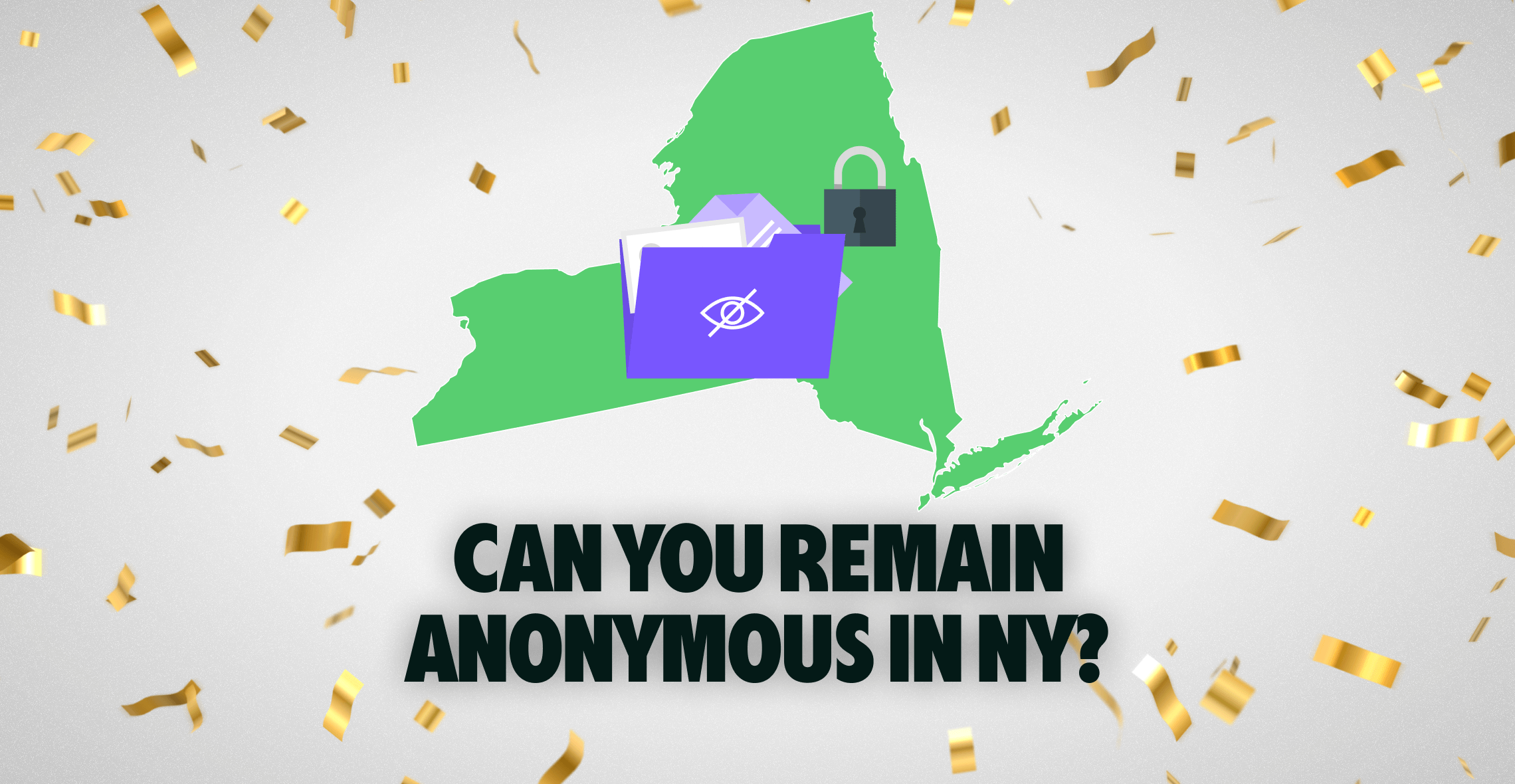Can You Remain Anonymous When Winning the New York Lottery? The Complete Guide
Written by Jackpot Staff
August 14, 2025

Imagine hitting the jackpot on your New York Lottery ticket – the thrill of seeing those matching numbers, the rush of adrenaline, and then... the sudden dread of having your name announced to the world. For many winners, the question of privacy becomes just as important as the prize itself. But can you actually remain anonymous when winning the New York Lottery?
This comprehensive guide explores the current laws in New York, pending legislation that could change everything, and practical strategies to protect your privacy if luck strikes. Whether you're a regular player or just curious about lottery policies, understanding these rules could be crucial for your financial security and personal safety.
Current New York Lottery Anonymity Laws
As of 2025, New York State law requires lottery winners of prizes exceeding $5,000 to disclose their name, city of residence, and prize amount to the public. This transparency requirement stems from the New York Lottery's status as a government agency, where public disclosure is considered essential for maintaining trust in the system.
This mandatory disclosure has real consequences. In a troubling 2023 case, a lottery winner's cousin forged documents to steal over $500,000 after learning about the win through public disclosure. The incident highlighted the vulnerability winners face when their identities are revealed.
What Information Becomes Public
When you win a substantial prize in the New York Lottery, here's what typically becomes public record:
- Your full legal name
- City and county of residence
- Prize amount won
- Game played and date of winning
The lottery commission may also request your participation in promotional activities, including press conferences and photo opportunities with the ceremonial large check.
Pending Legislative Changes for Winner Privacy
The landscape for lottery winner privacy in New York is potentially on the verge of significant change. In February 2025, the New York Senate passed Senate Bill S2613 with an overwhelming 59-2 vote. If enacted, this legislation would allow winners to remain anonymous unless they explicitly consent to public disclosure.
Key provisions of the bill include:
- Prohibiting the Lottery from disclosing names, addresses, or other identifying information
- Exempting winners from mandatory press events or public appearances
- Allowing winners to maintain their privacy while still collecting their prizes
A companion bill, Assembly Bill A6555, is currently under review in the Assembly's Racing and Wagering Committee. This bill includes similar protections but adds a 30-day notification period for winners to request anonymity after claiming their prize.
The Debate Over Transparency vs. Privacy
Not everyone supports these changes. Senator Joseph Griffo, one of the two votes against S2613, argued that "public disclosure ensures the Lottery's integrity and prevents state misappropriation of funds."
This tension between transparency and privacy isn't new. Former Governor Andrew Cuomo vetoed a similar bill in 2018, citing the need for public verification of winners. However, current Governor Kathy Hochul has not publicly opposed anonymity measures, suggesting a potential shift in policy.
Legal Strategies to Protect Your Privacy
While full anonymity is currently restricted under New York law, winners can employ several legal structures to shield their identities:
1. Establishing a Blind Trust
A blind trust allows you to claim your winnings through a third-party trustee who manages the funds without disclosing your identity as the beneficiary. Here's how it works:
- Consult with an attorney specializing in trusts before claiming your prize
- Establish the trust with a neutral name that doesn't identify you
- Have the trustee claim the prize on behalf of the trust
- Receive distributions through the trust while maintaining privacy
Important note: While this approach provides some protection, New York lottery officials may still require disclosure of the trust beneficiaries for prizes above certain thresholds.
2. Creating a Limited Liability Company (LLC)
Another potential strategy involves forming an LLC before claiming your prize:
- Create an LLC with a generic name
- Transfer the winning ticket to the LLC
- Have the LLC claim the prize as the legal entity
However, New York does not explicitly allow LLCs to claim prizes anonymously, and winners must still provide personal information for tax purposes. The effectiveness of this strategy varies depending on specific circumstances and current enforcement practices.
3. Learning from Legal Precedents
In 2018, a New Hampshire Powerball winner successfully sued to remain anonymous after signing her ticket in her name. The court ruled that her privacy rights outweighed public disclosure requirements. While this case doesn't directly apply to New York, it highlights growing recognition of privacy concerns in lottery disputes.
The Real Risks of Public Disclosure
The push for anonymity isn't just about avoiding unwanted attention. Publicly identifying lottery winners exposes them to serious risks:
Financial Exploitation
According to a study by the National Endowment for Financial Education, nearly 70% of people who suddenly receive large sums of money lose it within a few years. Public disclosure exacerbates this problem by making winners targets for:
- Investment scams targeting newly wealthy individuals
- Predatory lending schemes
- Excessive requests from family members and acquaintances
- Fraudulent charitable solicitations
Safety Concerns
The dangers go beyond financial exploitation. High-profile cases include:
- A Georgia lottery winner who was murdered in 2016 after her identity was disclosed
- Multiple winners reporting harassment, stalking, and home invasions
- Kidnapping threats against winners' family members
Legal Challenges
Winners also face increased legal vulnerabilities, including:
- Disputes over shared winnings or promises to distribute funds
- Frivolous lawsuits from individuals seeking a portion of the prize
- Challenges from creditors or in divorce proceedings
What to Do If You Win the New York Lottery
If you're fortunate enough to win a substantial prize in the New York Lottery, consider these steps to maximize your privacy protection:
- Don't sign the ticket immediately. Once signed, the ticket becomes linked to your identity. Consult with an attorney first to discuss your options.
- Keep your win confidential. Limit who knows about your good fortune until you've developed a comprehensive plan.
- Assemble a professional team. Before claiming your prize, hire:
- An attorney specializing in lottery or trust law
- A financial advisor experienced with sudden wealth
- A tax professional familiar with lottery winnings
- Consider timing. If privacy legislation is pending, you might have options for delaying your claim (within the allowed timeframe) until new protections are in place.
- Prepare for publicity. If anonymity isn't possible, work with a public relations professional to manage media interactions and develop a strategy for handling public attention.
The Future of Lottery Winner Privacy in New York
The fate of S2613 and A6555 will significantly impact future lottery winners' privacy options. If enacted, New York would join states like Delaware, Kansas, and Wyoming, which already permit anonymous claims.
The legislative outlook appears promising for privacy advocates. Unlike former Governor Cuomo, Governor Hochul has shown more openness to anonymity protections, and the overwhelming Senate support suggests growing recognition of winners' privacy concerns.
Key factors that will influence the final outcome include:
- Public trust considerations in lottery operations
- Implementation challenges for the Lottery Commission
- Balancing transparency with legitimate privacy and safety concerns
Enjoy Your Favorite Lottery Games Securely with Jackpot.com
While navigating privacy concerns, many lottery enthusiasts are discovering the convenience and security of platforms like Jackpot.com. With Jackpot.com, you can browse your favorite lottery games, review recent winners, and securely order state and national lottery tickets from the comfort of your own home.
Is it legal to order lottery tickets online? Absolutely! Players can order lottery tickets online in regulated states through secure, state-licensed lottery apps like Jackpot.com. These licensed lottery ticket courier services work in collaboration with local retailers in each state to ensure your online lottery ticket orders are secure and compliant with state regulations.
Test your luck with Jackpot.com and online lottery tickets today!
Balancing Privacy and Participation
As of mid-2025, New York lottery winners cannot fully remain anonymous under current law. However, pending legislation could soon grant opt-out anonymity, aligning the state with growing national trends recognizing the legitimate privacy and safety concerns of winners.
Until then, winners must navigate a complex landscape of legal strategies and inherent risks. By understanding the current requirements, monitoring legislative developments, and consulting with appropriate professionals, you can make informed decisions about protecting your privacy while still enjoying the excitement of the New York Lottery.
Remember these key takeaways:
- Current law requires disclosure of your name, city, and prize amount for wins over $5,000
- Pending legislation could soon allow winners to remain anonymous
- Legal structures like trusts offer partial privacy protection
- Professional guidance is essential if you win a substantial prize
Ready to try your luck? Visit Jackpot.com to securely order your New York Lottery tickets online today!

